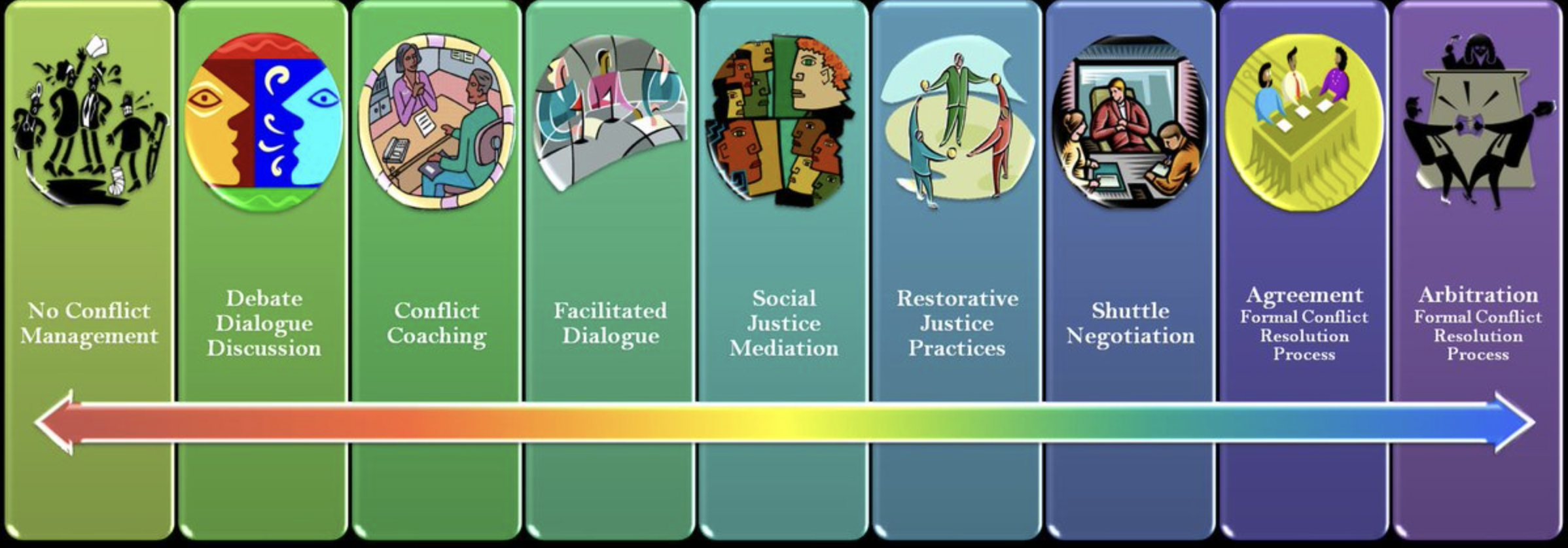
OSCR offers a spectrum of services that may be tailored to meet individual circumstances. Services may be accessed by meeting with an OSCR Facilitator or Resolution Coordinator. ACR pathways may be accessed without submitting written documentation while FCR pathways require submission of a written complaint alleging a violation of the Statement.
- Do you want to resolve a conflict with a UM student without getting that student “in trouble” with the University or the law?
- Do you want to be empowered and supported in navigating conflicts in a way that is comfortable for you, and where you have agency in shaping process and outcomes?
- Do you want to be able to define the parameters for how to address your conflict while utilizing conflict specialists?
If so, then Adaptable Conflict Resolution may meet your needs. Services are free, private, and completely voluntary every step of the way. They can be accessed for a variety of types of conflict, including roommate disputes, disagreements within or between student organizations, and other types of interpersonal conflict. Our ACR processes can be utilized if at least one U-M student is involved in the conflict at hand. OSCR offers a spectrum of services that may be tailored to meet individual circumstances or preferences. Services may be accessed by completing the online form below or reaching out to OSCR by phone, email, or walking into our office to request a consultation.
To see a more detailed explanation of resolution pathways available under the Adaptable Conflict Resolution (ACR) program, please open the various tabs to the right. If you have further questions or would like additional information on ACR services, feel free to contact us!
If you are interested in meeting with an OSCR staff member to explore constructive ways to approach conflict without the other people involved in the conflict knowing that you’ve contacted a support resource, consider Conflict Coaching.
If you are interested in having a conversation with another person or group of people and would like a multipartial facilitator to help guide the conversation in the dialogue, consider a Facilitated Dialogue. Please note, our facilitated dialogue services are very similar to our mediation services. Facilitated Dialogues center the perspectives of those involved and are particularly helpful for cases involving interpersonal harm and relationship-based resolutions.
If you would like a trained mediator to help you explore possible resolutions to a conflict with another person or people consider a Mediation. Please note, our mediation services are very similar to our facilitated dialogue services. Mediations are often more focused on monetary or action-based resolutions (e.g. determining rent/utilities, repaying a loan, performing a specific action).
If you have specific ideas for things you’d like to see worked out, but you don’t want to have direct interaction with the other person involved, consider Shuttle Negotiation. We realize that not all conflicts may constitute a "negotiation," therefore this service is occasionally referred to as Shuttle Diplomacy to support conflicts and situations where parties may wish to exchange information back and forth that do not always constitute a negotiation of some terms of an agreement.
Oftentimes, conflicts can impact more than just those directly involved or they involve an organization, department, or class. Restorative Justice Circles offer larger groups (4+ people) an opportunity to discuss a particular situation together and identify potential paths forward to repair any harm that has occurred.
Acknowledgement: It is important to note that Restorative Justice (RJ) did not originate at U-M nor in Higher Education. To learn more about Restorative Justice, its philosophies, and its history, please visit our Restorative Justice page.
Formal Conflict Resolution is only available for incidents that rise to an alleged Statement violation. Both the complainant (the party alleging the violation) and the respondent (the student named in the complaint) will have the opportunity to meet with OSCR Staff to discuss options in the FCR process, and both are entitled to have an advisor present at any meetings with OSCR.
It is important to consider that although a behavior or situation may constitute a Statement violation, not all Statement violations have to proceed through FCR. FCR can be disciplinary in nature and result in a record for a student. All aforementioned ACR services in this accordion do not result in a disciplinary record for any party involved.
